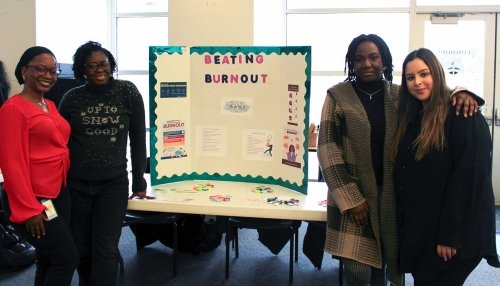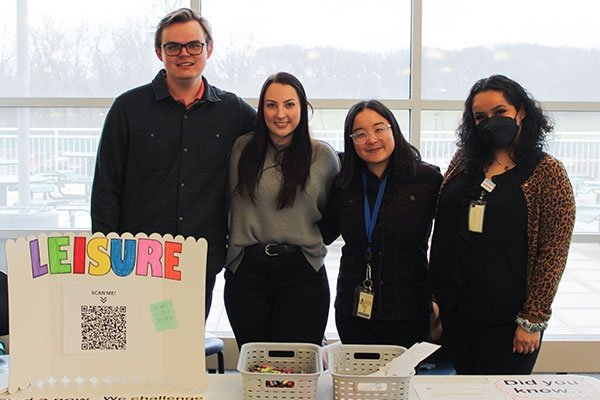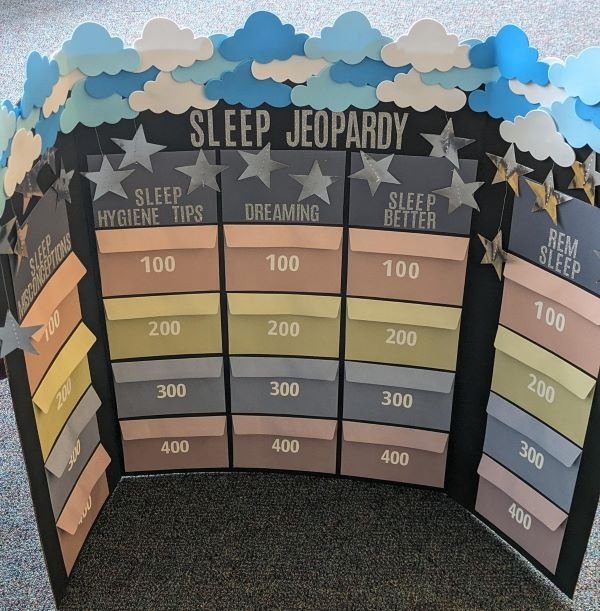Occupational Therapy Health and Wellness Fair Provides Information and Insight
Occupational Therapy students give presentations about self-care, occupational therapy field
- IL - Downers Grove

Avoiding burnout was one of the informative topics presented. From left to right: Priscilla Aluko, Aline Ngouemeta Mbognou, Daphney Gabriel, and Sana Khatoon.
Occupational Therapy students held a Health and Wellness Fair on the Downers Grove Campus to inform the Midwestern University community about strategies for better self-care and to promote an understanding of occupational therapy. The fair was a part of their self-management class, and each group developed a handout, an activity, and a prize to give away.
As a part of the class, students “learn ways to effectively deliver messages to different groups of people to promote health and wellness. The goal of the fair was to share information, but I also wanted the students to take this opportunity to teach others about the role of occupational therapy in self-management, health, and wellness,” said Susan Charnley, DrOT, OTR/L, CHT, Assistant Professor, Occupational Therapy. Dr. Charnley added that occupational therapists can help patients “to not only learn strategies for self-management, but also learn how to incorporate these strategies into their lives. Occupational therapists analyze the client’s daily routines, roles, habits, and work with the client to find ways to change or modify these patterns to improve their health. All the handouts given included information describing occupational therapy as it related to the presentation topics,” she said.
The students chose their own presentation topics with the consideration of healthcare students, staff and faculty at Midwestern University. The topics included leisure activities, sleep hygiene, finding a work-life balance, proper diet and nutrition, incorporating exercise into a daily routine, avoiding burnout, and art as a way of expression and relaxation.
One of the activities featured writing goals on colorful Post-It notes. “Occupational therapists work with clients to develop personal goals. As part of the goals, it’s important to do leisure activities to reduce anxiety and stress. For example, a goal could be setting aside time for coffee with a friend,” said Gabriela Carmona (CHS OT ’25).

Another concern is burnout due to busy schedules. “We’re showing how to beat burnout. My research has shown around 80 percent have burnout symptoms. It’s a great opportunity to shed light on this. People can address their burnout and ways to cope,” said Priscilla Aluko (CHS OT ’25). The students offered tips on preventing burnout such as identifying the cause, ways to reduce burnout, signs of burnout, and how to recover from being overworked.
The students were also mindful that a work-life balance is a continuous struggle. “People should balance the things they want to do and the things they need to do. Make sure to make time for relaxation and hobbies,” said Emily Agemura (CHS OT ’25). Trisha Mallare (CHS OT ’25) added, “Set a schedule with a studying time limit and make sure to set aside time for leisure activities. With a schedule it’s easier to get things done.” To assist with time management, one of the handouts had a visual of a clock with markers to color code time for leisure, individual care, free time, and efforts in studying and work.
One aspect of adhering to a balanced schedule is ensuring proper sleep. “We talk with all the students, especially the first-year students, about tips and tricks for better sleep, and how to implement them,” said Sydney Roberts (CHS OT ’25). One of the activities featured a sleep jeopardy game with categories such as sleep misconceptions, sleep hygiene tips, dreaming, sleep better, and REM sleep. Dr. Charnley added, “Occupational therapists often assess and address the occupation of sleep, sleep patterns and sleep hygiene with their clients.”

Another aspect of a healthy lifestyle is making time for exercise. “Exercise equals happiness. It lowers stress, increases endorphins, improves your mood, and helps your overall performance of daily activities, especially your academic performance,” said Talya Flores (CHS OT ’25). “Most of us sit all day. There are simple exercises to increase movement, even sitting exercises.” Talya added additional recommendations such as taking the stairs instead of the elevator, taking a lap around the building during a break, and incorporating stretch breaks into the daily routine.
Part of a healthy, balanced lifestyle is an emphasis on proper nutrition. Jillian Paguiligan (CHS OT ’25) emphasized the importance of nutritional meals. “It’s so important as graduate students because our time is limited. It’s hard to think about nutritional breakdown. We can lower the stress of eating healthily by preparing meals ahead of time. It’s also important to find a good routine.” The students also gave information about proper nutrition and samples of healthy drinks and snacks.
Quality of life and patient care is an integral part of Midwestern University. The University offers a Doctor of Occupational Therapy (O.T.D.) degree program is offered in Downers Grove, and a Master of Occupational Therapy (M.O.T.) degree program is offered in Glendale.



